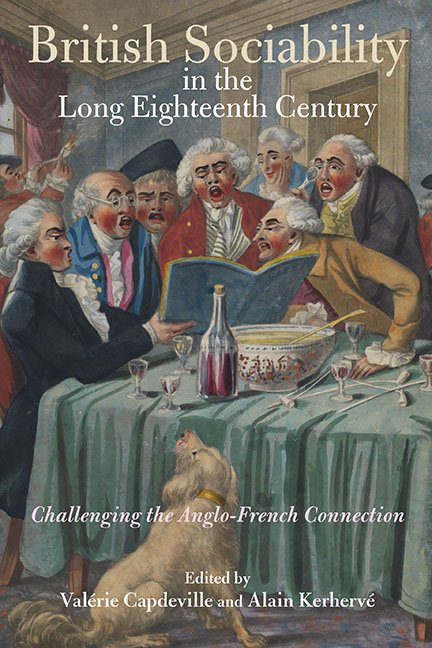Book contents
- Frontmatter
- Contents
- List of illustrations
- List of contributors
- Foreword
- Acknowledgements
- Introduction
- Part 1 Emergence of new political and social practices
- Part 2 Competing models of sociability
- Part 3 Paradoxes of British sociability
- 10 In company and out: the public/private selves of Johnson and Boswell
- 11 Friendship and unsociable sociability in eighteenth-century literature
- 12 The anti-social convivialist: toasting and resistance to sociability
- 13 Sociability and the Glorious Revolution: a dubious connection in Burke's philosophy
- 14 Respectability vs political agency: a dilemma for British radical societies
- Conclusion
- Bibliography
- Index
10 - In company and out: the public/private selves of Johnson and Boswell
from Part 3 - Paradoxes of British sociability
Published online by Cambridge University Press: 18 September 2019
- Frontmatter
- Contents
- List of illustrations
- List of contributors
- Foreword
- Acknowledgements
- Introduction
- Part 1 Emergence of new political and social practices
- Part 2 Competing models of sociability
- Part 3 Paradoxes of British sociability
- 10 In company and out: the public/private selves of Johnson and Boswell
- 11 Friendship and unsociable sociability in eighteenth-century literature
- 12 The anti-social convivialist: toasting and resistance to sociability
- 13 Sociability and the Glorious Revolution: a dubious connection in Burke's philosophy
- 14 Respectability vs political agency: a dilemma for British radical societies
- Conclusion
- Bibliography
- Index
Summary
Sociable conversation
SOCIABLE CONVERSATION, in all periods, but especially in the formal atmosphere and gender-restricted context of the eighteenth century, is the public face of the individual: that which is on display as against that which remains, more or less effectively, hidden from view. It represents the self that we wish to present to the world, even if that world is in the form of friends and family. The private self, certainly, can sometimes be observed through the cracks, and few performances are perfect, but to discover the extent and nature of that private self demands other sources, other more intimate means of inquiry, and other kinds of relationships. With writers like Johnson and Boswell we are unusually privileged, in that the opportunities are there for comparison between the self in performance and the self that can be read in their published and unpublished works. Thanks to Boswell, especially to his journal and his works on Johnson, we are afforded unique insights into both himself and his friend and idol Johnson, their inner selves as against their public and social personalities. In understanding these differences in perspective we can also read something of the nature of eighteenth-century society, of the weight given to social presence and performance and of the generally forbidden territory that was occupied by inner realities. This chapter explores some of those performances and some of that territory.
Samuel Johnson and James Boswell valued sociability as amongst the very highest pleasures of living within a civilised society. The whole business of interchange of ideas, of pleasantries, even of insults – in short, of what had become known in the period as clubbability – are conspicuously present in all accounts of the ways they chose to spend their time, both when together, during Boswell's usually annual visits to London, and in the course of their separate lives. Yet this straightforward truth also conceals personal complexities in each man's case that make their respective attitudes towards company, conversation and sociability a good deal more paradoxical. Much as they genuinely enjoyed sociable companionability, different, and sometimes overlapping, facets of their personalities at times pulled against their clubbable capacities: competitiveness, self-indulgence, depression and world-weariness were all essentially anti-social tendencies that either were in danger of damaging the civilised within society or by their very nature made isolating and self-absorbing demands on each man.
- Type
- Chapter
- Information
- British Sociability in the Long Eighteenth CenturyChallenging the Anglo-French Connection, pp. 185 - 198Publisher: Boydell & BrewerPrint publication year: 2019

